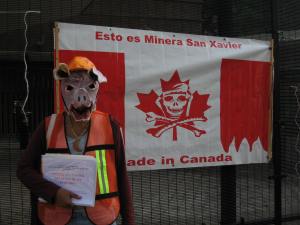
Mining is one of my favorite hobby horses because it is a lightening rod for the promotion of awful policy. so here we go again.
Understand that Mexico has been black hole for bad mining law as long as I was in the business of underwriting mining projects. The mere fact that investment is happening there is a testamont to better policy showing up.
the ony reason that investment has actual traction is that the investor brings best practice and will pay taxes not royalties. that also includes paying top salaries to anyone prepared to work and live there. The alternative is so called hand mining using atrocious environmental methods and of course, paying no taxes. Those folks can even be integrated in as well often as not.
Understand that most mines have a footprint under a square mile and we have few of them and they are a rare economic local boosters anywhere. modern methods do manage the environmental impact and let us leave that alone. The real environmental problem has always been farming which is slowly getting better.
Big Bad Canada Pushes to Protect Profits from Mexico
By Yves Engler
Global Research, May 16, 2023
Yves Engler 11 May 2023
Region: Canada, Latin America & Caribbean
Theme: Environment
https://www.globalresearch.ca/big-bad-canada-pushes-protect-profits-from-mexico/5819420
The Trudeau government is pressing Mexico to maintain its loosely regulated, pro-capitalist mining policies.
Recently the Mexican government initiated more socially and ecologically sound mining legislation. The reform shortens mining concessions, tightens rules for water permits and requires companies to provide at least 10 per cent of profits to the communities where they operate. In “Mexico’s ‘shock’ new mining law hurts juniors most,” Mining.com complains that “companies now have to deal with an increased burden of pre-consultation, impact studies and water concessions, among other things. The new law also requires financial commitments (bonding) that would be difficult to meet for junior explorers.” While Canada’s many “junior” exploration firms will be adversely affected, the reforms will benefit local communities and the environment. But that hasn’t stopped Ottawa from pressing the Mexican government to shift gears.
Two weeks ago, Trade Minister Mary Ng publicly criticized the mining reforms. In a statement released after speaking with Mexican Economy Minister Raquel Buenrostro, Ng “expressed her concern with Mexico’s proposed mining reforms, which could affect Canadian investment in Mexico’s mining sector, as well as potential impacts on North American competitiveness and supply chain resiliency. The minister reiterated the importance of conducting broad and transparent consultations with all stakeholders regarding the proposed reforms, including with Canadians companies, which represent the largest group of foreign investors in Mexico’s mining sector. Minister Ng reiterated the important contributions of Canadian mining companies to the Mexican economy.”
A week later Ng raised the matter with US Trade Representative Katherine Tai. Afterwards they released a statement suggesting that “recent changes in Mexico’s mining law” violated the United States-Mexico-Canada Agreement. The next day Canada’s ambassador to Mexico and the representatives of multiple Canadian mining companies met Minister Buenrostro.
Seventy per cent of foreign-owned mining companies operating in Mexico are Canadian-based. Two years ago the front page of national daily La Jornada blared: “Poseen mineras canadienses 60% del oro mexicano” (Canadian mining companies own 60% of Mexican gold). Canadian firms have had many disputes with local communities over the impact of their operations on local water systems and ecosystems. Similarly, Canadian companies have been implicated in many rights violations including high-profile killings.
The Canadian Embassy in Mexico City has openly backed some of the most controversial firms. For its part, the Trudeau government went to bat for half a dozen mining companies embroiled in a dispute over US$360 million in tax rebates with the Mexican government. “In a string of meetings, Canadian officials have pressed Mexico to fix the problem”, noted a June 2017 Reuters story. During a trade mission to Mexico that year natural resources minister Jim Carr “raised the matter with Mexico’s Secretary of the Economy.”
Canadian mining companies have benefited from neoliberal economic policies in Mexico. There were no Canadian mines operating in Mexico in 1994. By 2010 there were about 375 Canadian-run projects. Before the reforms that came with the North American Free Trade Agreement, Mexico’s constitution dictated that land, subsoil and its riches were the property of the state and recognized the collective right of communities to land through the ejido system. Constitutional changes in 1992 allowed for sale of lands to third parties, including multinational corporations. Combined with a new Law on Foreign Investment, the Mining Law of 1992 allowed for 100 percent foreign control in the exploration and production of mines. Canadian mining companies have been the biggest winners from these reforms.
As President Andres Manuel Lopez Obrador (AMLO) has reversed decades of neoliberal reforms Canadian companies are faced with a less profitable prospects. Unsurprisingly, they are pushing back and the Trudeau government is assisting them despite the social and ecological benefits gained by the mining reforms. It’s the Ugly Canadian in action.
No comments:
Post a Comment